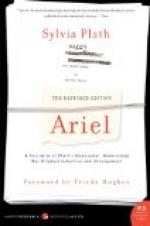|
This section contains 470 words (approx. 2 pages at 300 words per page) |

|
[In the poems of Ariel], Sylvia Plath becomes herself, becomes something imaginary, newly, wildly and subtly created—hardly a person at all, or a woman, certainly not another "poetess," but one of those super-real, hypnotic, great classical heroines. This character is feminine, rather than female, though almost everything we customarily think of as feminine is turned on its head. The voice is now coolly amused, witty, now sour, now fanciful, girlish, charming, now sinking to the strident rasp of the vampire—a Dido, Phaedra, or Medea, who can laugh at herself as "cow-heavy and floral in my Victorian nightgown." Though lines get repeated, and sometimes the plot is lost, language never dies in her mouth.
Everything in these poems is personal, confessional, felt, but the manner of feeling is controlled hallucination, the autobiography of a fever…. The title Ariel summons up Shakespeare's lovely, though slightly chilling and androgenous...
|
This section contains 470 words (approx. 2 pages at 300 words per page) |

|


